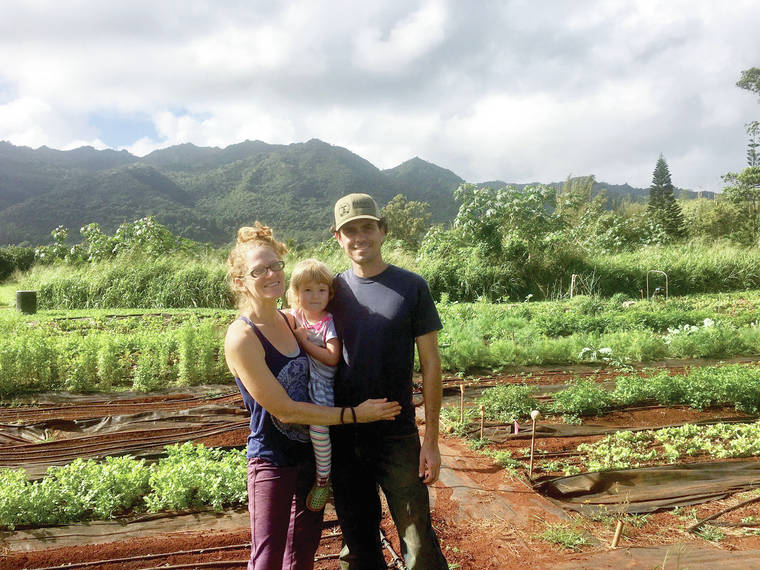MOLOA‘A — In the summer months, Jeremy Hillstrom’s True Leaf Farm runs a water bill of about $900 a month.
Cutting back on water isn’t an option. Hillstrom’s growing kale, collards, lettuce and carrots, among other crops. These vegetables need to stay cool, he said, so the farm uses uses overhead water to do so.
Louisa Wooten owns two farms. For the one in Moloa‘a, Kaua‘i Kunana Dairy, her water comes from the Moloa‘a Irrigation Cooperation, of which she is the general manager. Some billing cycles, water runs $3.90 per thousand gallons. Her other farm, which uses the county’s derived water, costs about $2.20 per thousand gallons for agricultural water.
Hopefully, that’ll change soon.
The Moloa‘a Irrigation Cooperative received a Coronavirus Aid, Relief and Economic Security (CARES) Act Grant from the county of $52,415 for water system improvements that will reduce the cost of water and leaks in the system.
The cooperative services 65 members in the Moloa‘a Hui Lands, covering almost 600 acres of agricultural land. MIC average non-revenue water losses of 25% monthly, Wooten said, so this grant will directly result in the lowering of water costs.
“Farmers in Moloa’a have sustained severe economic losses due to restaurant and market losses during the pandemic,” the grant project description reads. “This Kupa’a Kaua’i project will reduce water costs which will provide added resiliency to those farms. We are proud of the resourcefulness of our MIC members as they meet the challenges of establishing new cropping and marketing strategies in this difficult time.”
Wooten explained that because the cooperative is small, there’s not the “economy of scale” to further spread out how much people are paying for their water per thousand gallons. Most months, bills range from about $3.50 to $3.90 per thousand gallons.
Water leaks have been an ongoing issue for the cooperative. The current system was developed during the plantation era using steel pipes that have a tendency to leak. The water that is accounted for on the master meter does not translate to the amounts accounted for on cooperative member’s meters. So, the cooperative is paying for water that never makes it to the farms.
In 2018, individual meters were upgraded with funding from the Department of Land and Natural Resources Commission and the county’s Office of Economic Development. This furthered the work from 2013 when the cooperative replaced inaccurate analog meters in 2013.
But this project would target the master meter, which is about a mile away from the cooperative’s water storage tank. This is possibly where the non-revenue losses are coming from, in addition to an inaccurate old flow meter.
“There are undoubtedly water losses,” Wooten said. “That one mile could account for a lot.”
This fix will allow the cooperative to conserve water, save money and hopefully be able to put those dollars toward other bills.
“This is going to help farmers defray the losses of water and make them more competitive,” Wooten said.
In addition to this CARES Grant, the cooperative also received a grant of $6,393.61 for the master meter itself from the Hawai‘i Community Foundation. This grant didn’t allow for the construction costs, but the county did.
Once the parts get there from the Mainland, construction will begin right away, Wooten said. The county’s Department of Water has offered to supply the farms with drinking water for those days should the cooperative run into issues.
Hillstrom said he pays upwards of $600 a month on water outside of the summer.
The coronavirus pandemic, Hillstrom said, is especially tough on farmers. True Leaf, specifically, has a lot of restaurant customers who cater to tourists.
“We’re all just surviving,” Hillstrom said. “It’s nice to feel the support from the community and county.”
This article was updated at 7:30 a.m. on Sept. 1 to clarify that the county’s Department of Water will offer the cooperative drinking water if it runs into a problem during construction, not water for the farms.
•••
Sabrina Bodon, public safety and government reporter, can be reached at 245-0441 or sbodon@thegardenisland.com.


